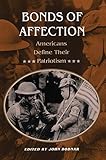Bonds of Affection : Americans Define Their Patriotism / ed. by John Bodnar.
Material type: TextPublisher: Princeton, NJ : Princeton University Press, [2021]Copyright date: ©1996Description: 1 online resource (360 p.) : 9 halftones 1 line illusContent type:
TextPublisher: Princeton, NJ : Princeton University Press, [2021]Copyright date: ©1996Description: 1 online resource (360 p.) : 9 halftones 1 line illusContent type: - 9780691219363
- Patriotism -- United States -- History
- HISTORY / United States / 19th Century
- African Americans
- American Revolution
- Armistice Day
- Bingham, Caleb
- Britain
- Bush, George
- Catholics
- Civil War
- Emancipation Day
- Fortune
- Germany
- Grand Army of the Republic (GAR)
- Gulf War
- Hardy, John T
- Hitler, Adolf
- Inman, Bobby Ray
- Jensen, Kimberly
- Jews
- Korean War
- Ku Klux Klan
- Lincoln, Abraham
- Littlefield, Henry
- McKinley, William
- Memorial Day
- Napoleon
- National Reform Bureau
- Oleksiak family
- Reconstruction
- abolition of slavery
- consumerism
- deindustrialization
- democracy
- ethnics
- feminism
- immigrants
- liberalism
- militarism
- patriotism
- 973 23
- E169.1 .B695 1996eb
- online - DeGruyter
| Item type | Current library | Call number | URL | Status | Notes | Barcode | |
|---|---|---|---|---|---|---|---|
 eBook
eBook
|
Biblioteca "Angelicum" Pont. Univ. S.Tommaso d'Aquino Nuvola online | online - DeGruyter (Browse shelf(Opens below)) | Online access | Not for loan (Accesso limitato) | Accesso per gli utenti autorizzati / Access for authorized users | (dgr)9780691219363 |
Frontmatter -- CONTENTS -- INTRODUCTION The Attractions of Patriotism -- CHAPTER 1 Teaching Patriotism: Private Virtue for the Public Good in the Early Republic -- CHAPTER 2 "Blood Brotherhood": The Racialization of Patriotism, 1865-1918 -- CHAPTER 3 Labor Republicanism, Race, and Popular Patriotism in the Era of Empire, 1890-1914 -- CHAPTER 4 Reading the Flag: A Reconsideration of the Patriotic Cults of the 1890s -- CHAPTER 5 A Christian Nation: Signs of a Covenant -- CHAPTER 6 Women, Citizenship, and Civic Sacrifice: Engendering Patriotism in the First World War -- CHAPTER 7 Patriotism in Orange: The Memory of World War I in a Massachusetts Town -- CHAPTER 8 Dreaming in Black and White: African-American Patriotism and World War II Bonds -- CHAPTER 9 In the Mirror of the Enemy: Japanese Political Culture and the Peculiarities of American Patriotism in World War II -- CHAPTER 10 "Good Americans": Nationalism and Domesticity in Life Magazine, 1945-1960 -- CHAPTER 11 Dilemmas of Beset Nationhood: Patriotism, the Family, and Economic Change in the 1970s and 1980s -- CHAPTER 12 Exalting "U.S.ness": Patriotic Rituals of the Daughters of the American Revolution -- CHAPTER 13 Moral Patriotism and Collective Memory in Whiting, Indiana, 1920-1992 -- CHAPTER 14 "Talking Lords Who Dare Not Face the Foe": Civilian Rule and the Military Notion of Patriotism in the Clinton Presidency -- AFTERWORD Nationalism in Europe -- CONTRIBUTORS -- INDEX
restricted access online access with authorization star
http://purl.org/coar/access_right/c_16ec
During the Civil War, Walt Whitman described his admiration for the Union soldiers' loyalty to the ideal of democracy. His argument, that this faith bonded Americans to their nation, has received little critical attention, yet today it raises increasingly relevant questions about American patriotism in the face of growing nationalist sentiment worldwide. Here a group of scholars explores the manner in which Americans have discussed and practiced their patriotism over the past two hundred years. Their essays investigate, for example, the extent to which the promise of democracy has explained citizen loyalty, what other factors--such as devotion to home and family--have influenced patriotism, and how patriotism has often served as a tool to maintain the power of a dominant group and to obscure internal social ills. This volume examines the use of patriotic language and symbols in building unity in the early republic, rebuilding the nation after the Civil War, and sustaining loyalty in an increasingly diverse society. Continuing through the World Wars to the Clinton presidency, the essay topics range from multiculturalism to reactions toward masculine power. In addition to the editor, the contributors include Cynthia M. Koch, Cecilia Elizabeth O'Leary, Andrew Neather, Stuart McConnell, Gaines M. Foster, Kimberly Jensen, David Glassberg and J. Michael Moore, Lawrence R. Samuel, Robert B. Westbrook, Wendy Kozol, George Lipsitz, Barbara Truesdell, Robin Wagner-Pacifici, and William B. Cohen.
Mode of access: Internet via World Wide Web.
In English.
Description based on online resource; title from PDF title page (publisher's Web site, viewed 30. Aug 2021)


